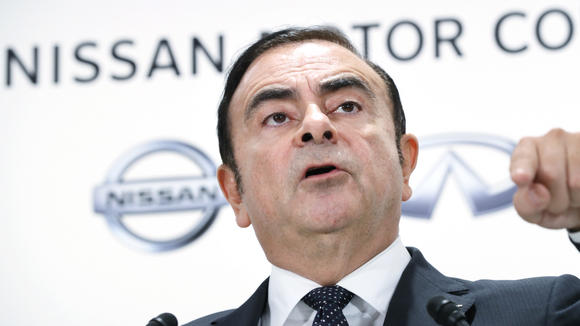
TOKYO (Kyodo) — Japan’s practice of detaining criminal suspects for extended periods of time before trial will again come under the spotlight following the latest arrest of former Nissan Motor Co. Chairman Carlos Ghosn.
Ghosn, who also served as chairman of Nissan’s alliance partner Renault SA, faces a fresh allegation of aggravated breach of trust related to the misuse of Nissan funds that caused losses of $5 million to the company.
He had earlier been charged with underreporting his remuneration and aggravated breach of trust, the latter for allegedly transferring personal investment losses to Nissan and paying a Saudi Arabian friend for help in processing charges related to the investment. Ghosn has denied all charges.
The alleged underreporting of remuneration and transfer of losses have not been viewed as causing actual damage to Nissan and, according to a source familiar with the investigation, have even led some prosecutors to speculate that a court could acquit Ghosn over the alleged payment to his Saudi acquaintance.
Akira Kitani, a lawyer who once served as a Tokyo High Court judge, said the fresh arrest warrant could be criticized as a means to prevent Ghosn from holding a news conference scheduled for next week.
Ghosn was preparing to meet the press on April 11 and tweeted Wednesday, “I’m getting ready to tell the truth about what’s happening.”
“I imagine the prosecutors are concerned that the previous charges are not sufficient to secure a guilty verdict,” Kitani said, adding the court may not approve another period of detention after being criticized for allowing the long detention of Ghosn after the prosecutors first arrested him in November.
The Tokyo District Public Prosecutors’ Office is expected to struggle to demonstrate the flow of funds overseas and win a courtroom battle with Ghosn’s defense team who criticized Thursday’s rearrest as “extremely inappropriate.”
The Ghosn case has focused international attention on Japan’s criminal justice system and the use of so-called hostage justice. Critics say the system enables authorities to hold alleged offenders in difficult conditions for long periods of time in the hope of inducing an admission of guilt.
After his first arrest, Ghosn was repeatedly denied bail and, as is traditional in Japan, was not permitted to be accompanied by a lawyer while being interrogated.
The practice of prolonging an alleged offender’s detention by incrementally adding charges has also been criticized overseas for enabling suspects to be denied the chance to file for bail. Ghosn was released on bail in early March after more than 100 days in detention.
The Tokyo District Court earlier conveyed the trial schedule for the case of alleged underreporting during a three-way discussion involving the prosecutors and Ghosn’s defense team. The court designated May 23 for the commencement of pretrial procedures to narrow down points of argument.
According to Ghosn defense lawyer Junichiro Hironaka, the court proposed holding the first trial as early as September, but Ghosn’s latest arrest means it is certain that timeline will not be met.
Some legal experts say the public’s view of the case has changed since further allegations surfaced and were reported inside and outside Japan.
“How people see the situation surrounding Mr. Ghosn has been changing since the last (third) arrest warrant was served. I don’t think (the fresh warrant) would invite international criticism,” said Yasuyuki Takai, a lawyer and former prosecutor.
“Generally speaking, it is not so unusual for someone released on bail to be served with a new warrant on a fresh allegation,” he said.
MAINICHI

Leave a Reply
You must be logged in to post a comment.